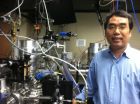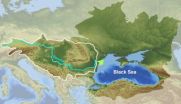(Press-News.org) A University of Central Florida research team has created the world's shortest laser pulse and in the process may have given scientists a new tool to watch quantum mechanics in action – something that has been hidden from view until now.
UCF Professor Zenghu Chang from the Department of Physics and the College of Optics and Photonics, led the effort that generated a 67-attosecond pulse of extreme ultraviolet light. The results of his research are published online under Early Posting in the journal Optics Letters.
An attosecond is an incomprehensible quintillionith of a second. In other words it would take 15 million billion pulses of the size Chang's team achieved to equal one second. The accomplishment is even more remarkable because the team did it without the use of specialized equipment including a mile-long particle accelerator or a Superdome-sized synchrotron.
"Dr. Chang's success in making ever-shorter light pulses helps open a new door to a previously hidden world, where we can watch electrons move in atoms and molecules, and follow chemical reactions as they take place," said Michael Johnson, the dean of the UCF College of Sciences and a physicist. "It is astounding to imagine that we may now be able to watch quantum mechanics in process."
Quantum mechanics is the study of physics at the microscopic level, specifically looking at energy and matter on this miniscule scale.
There is much excitement about the accomplishment and the promise Chang's work holds for helping scientists understand how the world's smallest building blocks actually work. The technique could lead scientists to understand how energy can be harnessed to transport data, deliver targeted cancer therapies or diagnose disease. The finding marks the first significant breakthrough in the laser pulse field in four years.
In 2001, attosecond pulses were demonstrated for the first time. Since then scientists around the world have been trying to make ever-shorter pulse durations because of the door they could open to understanding the subatomic world. The previous record of an 80-attosecond pulse was set in 2008 at the Max Planck Institute in Garching, Germany. This is the first time an American-led team has set the record.
"The quest for generating shorter and shorter pulses of light has been ongoing since the invention of the laser more than five decades ago," said Bahaa Saleh, dean of CREOL, the College of Optics and Photonics. "Dr. Chang's recent advance brings UCF to the forefront of this Olympic race and opens up new frontiers for seeing and recording ultrafast dynamic atomic phenomena."
Chang's team was able to accomplish the work at the Florida Atto Science &Technology (FAST) lab in UCF's Physical Sciences building.
Using the unprecedented power of laser light enables Chang and his peers to conduct their high-level research in much smaller spaces. Chang's group created a technique called Double Optical Grating that allows extreme ultraviolet light to be cut off in a manner that concentrates the maximum amount of energy in the shortest possible pulse of light. With the affinity for acronyms shared by many ultrafast laser physicists, Chang named the technique DOG. In addition to creating the light pulse, he created an even faster camera to measure it, which is the Phase Retrieval by Omega Oscillation Filtering (PROOF).
INFORMATION:
The Department of Defense's Multidisciplinary University Research Initiative and the National Science Foundation helped fund the research.
Others who contributed to the team's discovery include: Kun Zhao, Qi Zhang, Michael Chini, Yi Wu, and Xiaowei Wang, all at UCF.
UCF Stands For Opportunity --The University of Central Florida is a metropolitan research university that ranks as the second largest in the nation with more than 59,000 students. UCF's first classes were offered in 1968. The university offers impressive academic and research environments that power the region's economic development. UCF's culture of opportunity is driven by our diversity, Orlando environment, history of entrepreneurship and our youth, relevance and energy. For more information visit http://news.ucf.edu
UCF researchers record world record laser pulse
2012-09-05
ELSE PRESS RELEASES FROM THIS DATE:
Human impact felt on Black Sea long before industrial era
2012-09-05
When WHOI geologist Liviu Giosan first reconstructed the history of how the Danube River built its delta, he was presented with a puzzle.
In the delta's early stages of development, the river deposited its sediment within a protected bay. As the delta expanded onto the Black Sea shelf in the late Holocene and was exposed to greater waves and currents, rather than seeing the decline in sediment storage that he expected, Giosan found the opposite. The delta continued to grow. In fact, it has tripled its storage rate.
If an increase in river runoff was responsible for ...
U of M faculty find antimicrobials altering intestinal bacteria composition in swine
2012-09-05
MINNEAPOLIS/ST. PAUL (09/04/2012) — Researchers from the University of Minnesota's College of Veterinary Medicine, concerned about the use of antibiotics in animal production, have found that antimicrobial growth promoters administered to swine can alter the kind of bacteria present in the animal's intestinal track, resulting in an accelerated rate of growth and development in the animals.
Antibiotics are routinely administered to swine to treat illness and to promote larger, leaner animals.
The results of the study, conducted by Richard Isaacson, Ph.D., microbiologist ...
Little evidence of health benefits from organic foods, Stanford study finds
2012-09-05
You're in the supermarket eyeing a basket of sweet, juicy plums. You reach for the conventionally grown stone fruit, then decide to spring the extra $1/pound for its organic cousin. You figure you've just made the healthier decision by choosing the organic product — but new findings from Stanford University cast some doubt on your thinking.
"There isn't much difference between organic and conventional foods, if you're an adult and making a decision based solely on your health," said Dena Bravata, MD, MS, the senior author of a paper comparing the nutrition of organic ...
Showing the way to improved water-splitting catalysts
2012-09-05
PASADENA, Calif.—Scientists and engineers around the world are working to find a way to power the planet using solar-powered fuel cells. Such green systems would split water during daylight hours, generating hydrogen (H2) that could then be stored and used later to produce water and electricity. But robust catalysts are needed to drive the water-splitting reaction. Platinum catalysts are quite good at this, but platinum is too rare and expensive to scale up for use worldwide. Several cobalt and nickel catalysts have been suggested as cheaper alternatives, but there is still ...
Repeated exposure to traumatic images may be harmful to health
2012-09-05
Irvine, Calif., Sept. 4, 2012 – Repeated exposure to violent images from the terrorist attacks of Sept ember 11 and the Iraq War led to an increase in physical and psychological ailments in a nationally representative sample of U.S. adults, according to a new UC Irvine study.
The study sheds light on the lingering effects of "collective traumas" such as natural disasters, mass shootings and terrorist attacks. A steady diet of graphic media images may have long-lasting mental and physical health consequences, says study author Roxane Cohen Silver, UCI professor of psychology ...
A blueprint for 'affective' aggression
2012-09-05
A North Carolina State University researcher has created a roadmap to areas of the brain associated with affective aggression in mice. This roadmap may be the first step toward finding therapies for humans suffering from affective aggression disorders that lead to impulsive violent acts.
Affective aggression differs from defensive aggression or premeditated aggression used by predators, in that the role of affective aggression isn't clear and could be considered maladaptive. NC State neurobiologist Dr. Troy Ghashghaei was interested in finding the areas of the brain engaged ...
Vitamin D supplements do not improve cholesterol as previous research suggested
2012-09-05
Vitamin D has been touted for its beneficial effects on a range of human systems, from enhancing bone health to reducing the risk of developing certain cancers. But it does not improve cholesterol levels, according to a new study conducted at The Rockefeller University Hospital. A team of scientists has shown that, at least in the short term, cholesterol levels did not improve when volunteers with vitamin D deficiency received mega-doses of vitamin D. The finding is published in the journal Arteriosclerosis, Thrombosis and Vascular Biology.
The researchers, led by Manish ...
Preeclampsia poses a significant long-term health risk according to new research from Ben-Gurion U.
2012-09-05
BEER-SHEVA, ISRAEL, September 4, 2012 -- Ben-Gurion University of the Negev (BGU) researchers have determined that preeclampsia is a significant risk factor for long-term health issues, such as chronic hypertension and hospitalizations later in life. The findings from the retrospective cohort study were just published in the Journal of Maternal-Fetal and Neonatal Medicine.
Thousands of women and their babies die or get very sick from preeclampsia; it affects approximately 5 to 8 percent of all pregnancies. It is a rapidly progressive condition characterized by high blood ...
Study finds biologic therapies for rheumatoid arthritis not associated with increased cancer risk
2012-09-05
HOUSTON – Biologic therapies developed in the last decade for rheumatoid arthritis are not associated with an increased risk of cancer when compared with traditional treatments for the condition, according to new research from The University of Texas MD Anderson Cancer Center.
The study, published in The Journal of the American Medical Association (JAMA), is the largest systematic review evaluating the risk of developing any malignancy among rheumatoid arthritis patients using approved biologic response modifiers (BRMs), several of which include tumor necrosis factor ...
In elk hunting, success depends on the animal's personality
2012-09-05
(Edmonton) University of Alberta led research shows an elk's personality type is a big factor in whether or not it survives the hunting season.
Data collected from GPS collars on more than 100 male and female elk in southwestern Alberta showed U of A researchers the study population could be divided into two categories: bold runners and shy hiders:
Bold-runner elk, both males and females, moved quickly through the study area and preferred to graze in open fields for the most abundant and nutritious grass. GPS data showed shy hiders stayed and grazed on the sparse vegetation ...


